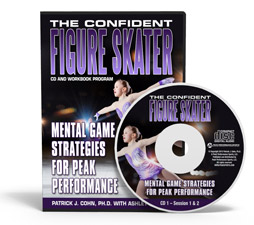Overcoming Fear of Failure Performing New Skills
Are you ready to add that new jump into your skating program or are you still hesitant to perform it in competition?
Performing a new skating skill in competition is a process. Attempts, mistakes, adjustments and more attempts are necessary to reach a certain comfort and confidence level in performing that new skill.
Once you feel comfortable with a new skill in practice, your next step is performing it in competition where the whole process of attempts, mistakes, adjustments and further attempts begins again.
This learning process is how figure skaters develop a belief in their abilities and increase their consistency especially under the stress of competition.
And as with any process, you must navigate through all the necessary steps if you want to achieve a successful outcome. In other words, you can’t get to ‘Z’ without going through ‘A, B, C,…’
The process requires patience and the mental fortitude to work through the performance dips without allowing those dips to run the “confidence well” dry.
The one thing that disrupts this learning process the most is fear of failure.
Fear of failure unfolds like this:
Becky wants to add a double axle to her arsenal of tricks. Becky is a little anxious about attempting the new skill just like any skater initially would be.
After several months of working on the double axle, Becky has improved but has yet to ‘perfect’ the skill.
Becky refuses to attempt the double axle in competition because she fears messing up in front of the audience, not to mention her coaches and parents.
Becky’s fear of failing causes her to delay performing the skill in competition. When Becky finally adds the double axle to her program, she is a bundle of nerves, crashes on the ice and never wants to attempt the skill again.
If you want strong programs and consistent performances, you need to have the patience to see the learning process through.
A good example of seeing the process through is Olympic gold medalist figure skater Yuzuru Hanyu.
Hanyu consistently tries to raise the bar with bigger challenges and more advanced skills. For that reason, Hanyu has been working on adding a ‘quad’ to his routine.
One unique thing about Hanyu is his understanding of the learning process and his willingness to risk mistakes as he works through the probcess.
Hanyu understands that mistakes are a step in the process and each mistake brings him one step closer to his desired outcome.
For that reason, Hanyu wants to attempt the quad early this season so he can work out the wrinkles before bigger skating competitions.
HANYU: “I need to do the quad loop, and I need to do it now, and I need to make the mistakes now, so that next year I’m not going through this [the learning curve].”
Hanyu’s coach Brian Orser agrees with the importance of competitive repetitions to work through the process of learning a new skill.
ORSER: “It’s not that important to win Skate Canada, it’s more important to get one more chance at figuring out the quad loop when you’re under pressure and you’re in front of judges, and in front of a crowd. It’s a completely different situation than when you are in a practice session.”
Stop waiting for conditions to be perfect. Working through the process requires repetition, including repetition under competitive circumstances.
Tips For The Optimal Mindset For Learning a New Skill
Set manageable objectives. First, let go of perfection as the only acceptable standards.
Create obtainable goals for performing the new skill in practices and competitions.
Don’t evaluate your performance in all or nothing terms (success or failure).
Look for the feedback from every attempt that will help move you further along the learning prbocess.
Start your mental training program today!
Related Sports Psychology Articles
- The Confidence to Perform New Skills in Competition
- Figure Skating Improvement Plan to Avoid Frustration
- Figure Skating Practice, Preparation, and Confidence
*Subscribe to The Sports Psychology Podcast on iTunes
*Subscribe to The Sports Psychology Podcast on Spotify
Download a free sports psychology report to improve your mental game!
Learn more about our one-on-one mental game coaching.
Discover Mental Strategies For Peak Performance!

You (or your athlete) might be the most skilled figure skater and train harder or longer than anyone else, but if you can’t take your practice performance to competition, you simply will not reach your true potential in figure skating.
Learn the top 8 mental game lessons to improve focus, composure, and confidence!
The Confident Figure Skater: Mental Game Strategies For Peak Performance
Discover proven mental game secrets to unstoppable confidence in practice and competition.
- Figure Skaters: Get the mental edge by learning how to take control of your confidence, mentally prepare for competition, and perform with composure under pressure.
- Coaches: Boost your figure skater’s confidence using simple, proven mental strategies.
- Parents: Help boost your athlete’s performance. Don’t let their mind hold them back any longer.
- Mental Coaches: Learn a proven system for helping your athletes boost mental toughness.
The Confident Figure Skater: Mental Game Strategies For Peak Performance

